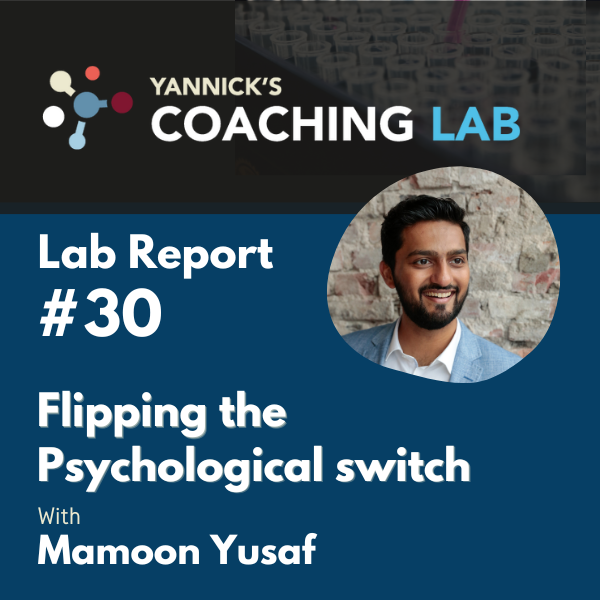
Yannick’s Coaching Lab features guest coaches from a broad variety of approaches, who showcase how they work as part of a live 45min coaching session, followed by reflections and Q&A with the audience.
Curious to know what this session was like? Have a peek at the Lab Report below or consider VIP membership to access the full recording of this and many more exciting sessions.
Yannick’s Coaching Lab #30 — Mamoon Yusaf
Lab Report by Daniel Lev Shkolnik
Summary
After discovering Tony Robbins and quitting his medical degree, Mamoon Yusaf began as a Quran coach and is now a successful spiritual coach and best-selling author. The core of his approach is “the psychological switch,” which is the perspective that emotions—and in fact all of our experience—arise from “thought.” Mamoon’s client was also Muslim and brought his grief of two recent losses to the coaching session: his father and his dog. Mamoon coached by offering silence, presence, and affirmations, along with relevant quotes from the Quran and concepts from various wisdom traditions.
Key Insights
Silence
One of the most palpable characteristics of Mamoon’s coaching session was the silence and space he provided his coachee. An audience member remarked afterward that the silences were not awkward but full of tenderness as the coachee worked his way through deep emotions at a pace that was comfortable to him.
Holding back vs. asking for permission
Mamoon held back a few interventions and challenging questions because he didn’t want to overstep any lines this early in the relationship. Upon reflections with the client it was clear that holding back was not the way to go and asking permission to challenge, even early in the relationship, would have been very appreciated by this client.
Coaching from Presence
Mamoon said he didn’t go into his signature coaching system, the psychological switch, because it wasn’t called for. Instead, he relied on presence. He was attuned and attentive to the needs of his coachee which, as Mamoon described it, allows him to work with intense emotions by grounding himself and his client in the present moment and not getting stuck in a past or future experience.
Affirming the Client
Throughout the session, Mamoon repeatedly affirmed his coachee. He acknowledged the way he is a light to those around him, and at one point even called him a “spiritual gangster” as a humorous compliment. These kinds of affirmations can help a person feel seen and empowered. Though Yannick reflected that even positive judgements are still judgements and may also have unintended drawbacks.
But Is that still coaching?
After the session, Mamoon admitted that he’d been on his “best behavior” as a coach during the Lab, knowing other trained coaches were observing. The coachee, however, said he wished Mamoon had “let loose” and not held back. This opened a larger conversation about how coaches approach intense emotions like grief and where the lines between therapy, coaching, and spirituality lie.
Coach-Client Alignment
Mamoon and his coachee had a high level of alignment. They shared a common Muslim background and had a similar spiritual outlook. The coachee said that when they first met- up before the Lab, trust quickly developed between them. This alignment allowed the session to move organically and fluidly.
Takeaways
Mamoon Yusaf is a coach who is unafraid to work with religious and spiritual content, even bereavement. This allows him to enter into rich dialogue with clients about some of life’s deepest questions—oneness, love, wisdom, etc. He draws on many wisdom traditions, which allows him to work with a wide variety of beliefs and worldviews. During the Lab, Mamoon demonstrated the graceful ways that presence, silence, and loving affirmation can allow a person to find clarity regarding their grief, their purpose, and even their faith.
Watch the recording of this session by joining the Lab as a member: www.GoCoachingLab.com
A list of all available recordings can be found at https://bit.ly/LabRecordings
This Lab Report was authored by Daniel Lev Shkolnik

